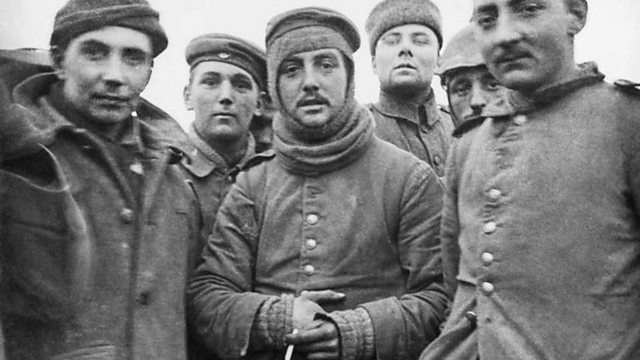11 Womanby Street, Cardiff: Eye-Witness Account of the 1914 Christmas Truce
The former treasurer of the Cardiff branch of the Royal British Legion remembers the truce between the British and the Germans Christmas 1914
Captain James Prince was the former treasurer of the Cardiff branch of the Royal British Legion at 11 Womanby Street. On 24 Decemeber 1974 he recorded an interview for Â鶹ԼÅÄ Radio Wales 'Good Morning Wales' programme. Here he recalls the moment when British and German soldiers stopped fighting and met in no-man’s land during the 1914 Christmas Truce - witnessing a rare glimmer of humanity in a brutal conflict.
On his first day in the front-line trenches at Ypres, Belgium, in 1914, James Prince remembers passing some bread to his fellow soldier who, rising to take it, stuck his head above the parapet. A German sniper’s bullet killed the soldier instantly.
Some 250,000 Allied and German troops were killed or wounded in the month-long Battle of Ypres that autumn. The First World War became bogged down in deadlock. The opposing sides were hidden in cold, water-logged trenches extending from the English Channel to the Swiss border.
Normally, no man’s land was filled with shadowy figures darting here and there: some reconnoitring, others trying to retrieve dead and wounded. Tonight, however, an eerie stillness hung in the crystal-clear air.
A German sang ‘Stille Nacht’ standing on top of the parapet – a perfect target. Prince’s regiment responded with ‘While Shepherds Watched Their Flocks By Night’. Then amazingly, the German started walking towards the British, followed by half a dozen other Germans, all unarmed with hands in pockets.
For a moment, it looked as if they were going to surrender, but the British started climbing out of their trenches, too. Prince was among them. Five metres from a German, he stopped. Here was one of the enemy he’d been shooting at. The German said simply: ‘I am a Saxon. You are an Anglo-Saxon. Why do we fight?’
Peace now swept through no man’s land. Soldiers from both sides shook hands, laughed, insisted they bore no malice against each other and vowed to continue the truce throughout the coming day.
Christmas day dawned cold, clear, sparkling – and peaceful. No man’s land was soon filled with thousands of soldiers from both sides, walking arm in arm and taking photographs. Several football matches were staged, mostly knockabout affairs with a tin can for a football and caps for goalposts.
It was also an opportunity for a solemn task in no man’s land. Soldiers of both armies dug graves side by side. Then the chaplain, assisted by a German divinity student, conducted a burial service.
By sunset, there had been almost no firing along the entire front for 24 hours, and as a result, the birds flew back. None had been seen on the battlefields in months, but now sparrows were everywhere.
The 1914 Christmas truce continued in a few sectors of the front until New Year’s Day or even later. ‘’ The general agreement was that when one side had to break the truce, they would fire a feu de joie into the air to give the enemy time to get back to their trenches. In Jim Prince’s sector, the feu de joie came on December 29, and the men scrambled back to their trenches to cries of ‘Go back, Tommy!’ or ‘Go back, Jerry!’ Only minutes later, firing resumed in earnest. For Prince, the football-lover who was to lose a leg several months later, the most wonderful Christmas he had ever experienced was over. And until he died in 1981, he could never hear ‘Silent Night, Holy Night’ without tears streaming down his cheeks. (pp39-41 Drive the Point Â鶹ԼÅÄ Graham Twelftree; Monarch Publications 1994).
During the First World War, Private James Prince, or Jim as he was known, served with the North Staffordshire Regiment, until a German shell blew him up in 1915, just five days after his 19th birthday. He returned to Britain and was treated in a London military hospital. His leg was amputated below the middle thigh and he had a series of operations.
Prince refused to give up, and despite having an artificial leg, he became treasurer of the Royal British Legion Club, Cardiff. He married a Cardiff girl and the couple settled in Wales. Later, during the Second World War, he volunteered for the Â鶹ԼÅÄ Guard.
Contributor: James Prince - recorded for Good Morning Wales 24 December 1974
Image courtesy IWM, World War I German and British soldiers stand together on the battlefield near Ploegsteert, Belgium in Dec 1914.
Location: 11 Womanby Street, Cardiff CF10 1BR (former Cardiff branch of the Royal British Legion)
Blog transcription: Northmead Uniting Church
Duration:
This clip is from
Featured in...
![]()
Â鶹ԼÅÄ Radio Wales—World War One At Â鶹ԼÅÄ
Places in Wales that tell a story of World War One
More clips from World War One At Â鶹ԼÅÄ
-
![]()
The loss of HMY Iolaire
Duration: 18:52
-
![]()
Scotland, Slamannan and the Argylls
Duration: 07:55
-
![]()
Scotland Museum of Edinburgh mourning dress
Duration: 06:17
-
![]()
Scotland Montrose 'GI Brides'
Duration: 06:41







